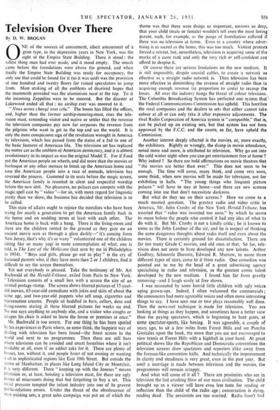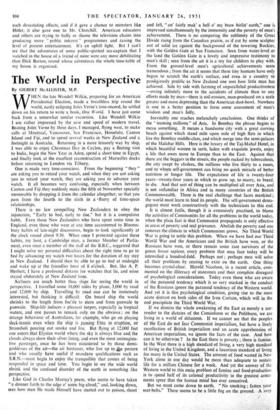Television Over There
By D. W. BROGAN
0 NE of the sources of amusement, albeit amusement of a grim type, in the depression years in New York, was the sight of the Empire State Building. There it stood ; the tallest thing man had ever made, and it stood empty. The smash came before the foundations were above the ground, and when
finally the Empire State Building was ready for occupancy, the only use that could be found for it (so it was said) was the provision of one hundred and twenty floors for ruined speculators to jump from. Most striking of all the emblems of deceived hopes that the mammoth provided was the aluminium mast at the top. To it the incoming Zeppelins were to be moored. But the disaster at Lakewood ended all that ; no airship ever was moored to it.
"Notrs awns change tout cela." The boom has filled the offices, and, higher than the former airship-mooring-mast, rises the tele-
vision mast, reminding visitor and native or settler that the revenue the television companies pay now far surpasses the revenue from the pilgrims who want to get to the top and see the world. It is only the most conspicuous sign of the revolution wrought in America by television, which has passed from the status of a fad to one of the basic features of American life. The television set has replaced the motor car as the emblem of American democracy, and it is almost revolutionary in its impact as was the original Model T. For if Ford put the American people on wheels, and did more than the movies or burlesque or any other menace to break up the American home and turn the American people into a race of nomads, television has reversed the process. Gummed to its seats before the magic screen, the American family is reunited in silent and respectful worship before the new idol. No pleasures, no palaces can compete with the magic spell cast by '' video "—for so, with more regard for linguistic purity than we show, the business has decided that television is to be called.
This state of affairs ought to rejoice the moralists who have been trying for nearly a generation to get the American family back in the home and on nodding terms at least with each other. The American home is back with a bang. There is the living-room and there arc the children rooted to the ground as they gaze on an ancient movie seen as through a glass darkly—" it's coming from New Jersey, that's why it's so wavy " volunteered one of the children sitting like so many yogi in mute contemplation of what, one is
told, is The Last of the Mohicans (last seen by me iti Philadelphia in 1934). " Boys and girls, please go out to play " is the cry of harassed parents who, if they have more than 2 or 3 children, find it difficult to see the screen themselves.
Yet not everybody is pleased. Take the testimony of Mr. Art Buchwald of the Herald-Tribune, exiled from Paris to New York.
" Television consists of a small box with a screen the size of an airmail postage stamp. The screen shows blurred pictures of 15-year- old movies, 65-year-old comedians with jokes and skits of about the same age, and two-year-old puppets who sell soap, cigarettes and rejuvenation creams. People sit huddled in bars, cellars, dens and king-rooms staring at these blurred pictures for weeks on end.
No one says anything to anybody else, and a visitor who coughs or scrapes his chair is asked to leave the house or premises at once." Mr. Buchwald is too severe. For one thing he has been spoiled by his experiences in Paris where, so some think, the happiest way of
dealing with television has been found—the finest screen in the world and next to no programmes. Then there are still bars where television can be avoided and smart hostelries where it isn't available at all, even if an addict asks for it. There are plenty of houses, too, without it, and people boast of not owning or wanting a set in sophisticated regions like East 39th Street. But outside the :entre of Manhattan, in places like Long Island City or Montclair, it as very different. There " keeping up with the Jonescs " means television or, at least, hoisting a television mast, for there are ugly stories of miscreants doing that but forgetting to buy a set. This social pressure tempted the infant industry into one of its gravest Public-relations errors. Under the threat of the obsolescence of most existing sets, a great sales campaign was put on of which the
theme was that there were things so important, sorrows so deep, that your child (male or female) wouldn't tell even the most loving parent, such, for example. as the pangs of humiliation suffered if there was no television at home. Even in a country where adver- tising is as sacred as the home, this was too much. Violent protests forced a retreat, but, nevertheless, television is acquiring some of the marks of a caste rank and only the very rich or self-confident can afford to despise it.
Of course there are serious limitations on the new medium. It is still impossible, despite coaxial cables, to create a network as
effective as a straight radio network is. Then television has been more effective in diminishing the revenue of straight radio than in acquiring enough revenue (in proportion to costs) to recoup the losses. All over the industry hangs the threat of colour television. The Columbia Broadcastiag System has perfected one system that the Federal Communications Commission has upheld. This horrifies the rival companies and the dealers in sets that either cannot take colour at all or can only take it after expensive adjustments. The rival Radio Corporation of America system is " compatible," that is, can be picked up on existing sets, but that system has not been approved by the F.C.C. and the courts, so far, have upheld the Commission.
Another interest deeply affected is the movies, or, more exactly, the exhibitors. Rightly or wrongly, the slump in movie attendance, noted more and more, is attributed to television. Why go out into the cold winter night when you 'can get entertainment free at home ? Why indeed ? So there are bold affirmations on movie theatres that " the movies are better than ever." This does not seem to be enough. The time will come, many think, and come very soon, some think, when new movies will be made for television, not for exhibition in halls. "The young things who frequent picture palaces " will have to stay at home—and there are new screens coming into use that don't necessitate darkness.
But what do they see on their screens ? Here we come to a much mooted question. The greatest radio and video critic in America, Mr. John Crosby of the New York Herald-Tribune. has
asserted that " video was invented too soon." by which he seems to mean before the people who control it had any idea of what to do with it. But Mr. Crosby is not a kindly critic ; he is known to some as the John Lardner of the air, and he is suspect of thinking the same dangerous thoughts about radio itself and even about the movies. There is certainly ground for dissatisfaction. There are far too many Grade C movies, and old ones at that. So far, tele- vision does not seem to have developed any new talents. Arthur Godfrey, Schnozzle Durante, Edward R. Murrow, to name three different types of stars, came to it from radio. One comedian was pointed out to me by the head of a great advertising agency specialising in radio and television, as the greatest comic talent developed by the new medium. I found him far from gravity removing—and I laugh easily at free shows.
I was nauseated by some horrid little children with ugly voices aping grown-ups. Indeed, I often welcomed the commercials ; the announcers had more agreeable voices and often more interesting things to say. I have seen one or two plays reasonably well done. Then the news-reel technique is made for television. You are
looking at things as they happen, and sometimes have a better view than the paying spectators, which is beginning to hurt gates, at some spectator-sports, like boxing. It was agreeable, a couple of years ago, to sit a few miles from Forest Hills and see Pancho Gonzales upset the book, the more that you are not encouraged to view tennis at Forest Hills with a highball in your hand. At great political shows like the Republican and Democratic conventions the television screens drew spectators and reporters alike away from the furnace-like convention halls. And technically the improvement in clarity and steadiness is very great, even in the past year. But until a marriage is made between television and the movies, the programmes will remain scrappy.
And what will come of it all ? There are pessimists who see in television the last crushing blow of our mass civilisation. The child brought up as a viewer will have even less taste for reading or reflection than the child of the radio age ; conversation is dying, reading dead. The pessimists are too worried. Radio hasn't had such devastating effects, and if it gave a chance to monsters like Hitler, it also gave one to Mr. Churchill. American educators and others are trying to bully or shame the television chains into producing more " public interest " programmes and raising the level of present entertainment. It's an uphill fight. But I can't sec that the adventures of some public-spirited sea-captain that I watched in the house of a friend of mine were any more debilitating than Dick Barton, round whose adventures the whole time-table of my house is organised.







































 Previous page
Previous page